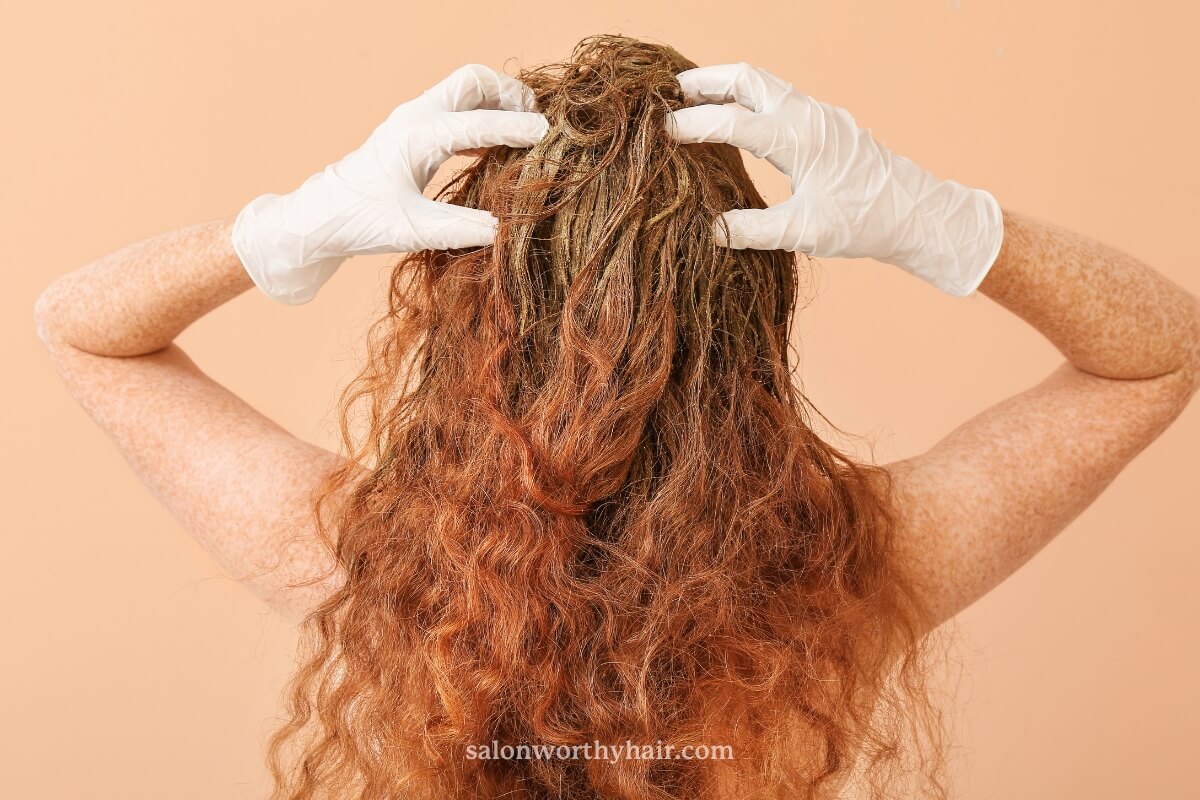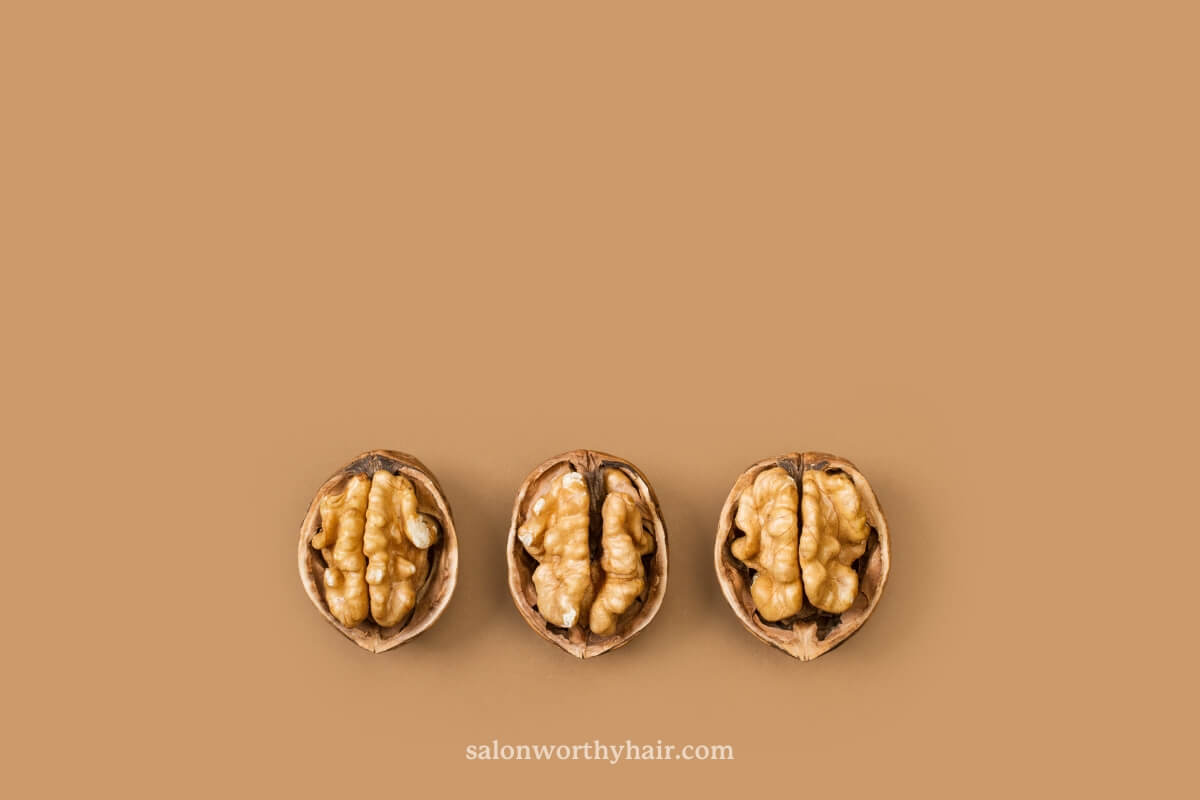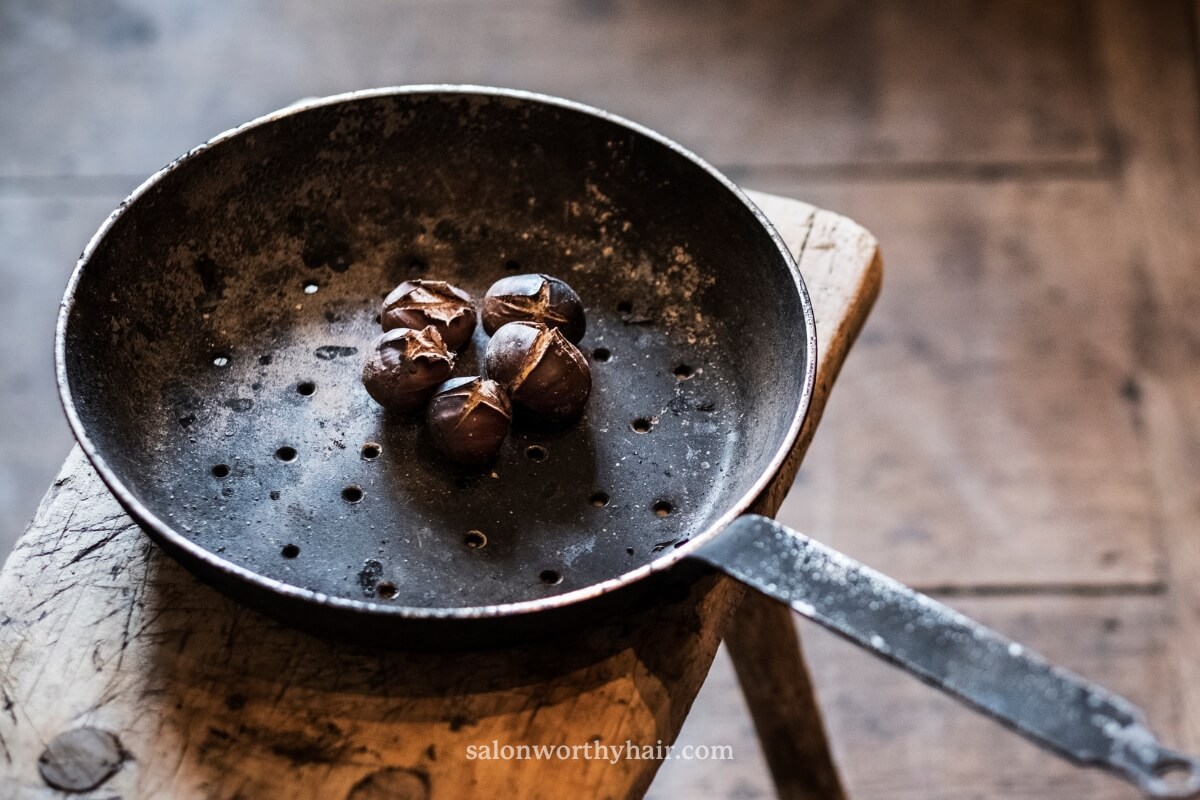Black Walnut Hair Dye – How to Make It and Use It to Color Your Hair
Updated on
This post may contain affiliate links. As an Amazon Associate, we may earn from qualifying purchases.

Black walnut hair dye is an all-natural hair color solution with deep, rich, and warm tones. It is a suitable alternative to commercial dyes owing to its minimal chemical content. Made from the hulls of the black walnut tree (Juglans nigra), black walnut hair dye delivers a semi-permanent color that ranges from a chocolate brown to a near-black hue.
What Color Does Black Walnut Hair Dye Make Your Hair?
Black walnut hair dye makes your hair dark brown with warm undertones, which can become darker with repeated applications. The precise color achieved with black walnut hair dye can be influenced by several factors, including the original hair color, the quality of the dye, and the length of time the dye is left in the hair. Its natural characteristics make it especially suitable for individuals looking to cover grays, deepen their hair color, or simply explore a new look without the harshness of synthetic dyes.
How Hair Dye Is Made from Black Walnuts
Making hair dye from black walnuts involves a simple and eco-friendly process, harnessing the natural pigments within these nuts’ hulls.
The process begins with gathering black walnuts, ideally when the hulls are transitioning from green to brown when the pigments are most potent. The walnut shells are then cracked, separating the outer hulls from the nuts inside.

The hulls are chopped into smaller pieces to facilitate better color extraction. These hull pieces are then placed in a large pot, submerged in water, and brought to a lively boil. This boiling process, which should last about an hour, coaxes the deep, rich natural color out of the hulls.
After boiling, the concoction needs to cool, after which the liquid is strained into a separate container, leaving behind a natural, homemade hair dye. The used hulls can be disposed of at this stage.
Another way to make hair dye from black walnuts involves using black walnut powder, a concentrated, versatile form of the walnut’s pigments. It’s ideal for those seeking to create their own natural dye without hulling and boiling whole walnuts.
How Does Black Walnut Powder Work as a Hair Dye?
Black walnut powder works as a hair dye due to the natural pigments in the black walnut hulls, which are concentrated in the powder. The hulls contain a compound called juglone, a naturally occurring dye that gives the black walnut its distinct, dark color. When the powder is mixed with water and applied to the hair, the dye penetrates the hair shaft and adheres to the hair strands, producing a deep, rich, dark brown to near-black hue.
How to Make Natural Dye With Black Walnuts
Creating a natural dye using black walnuts is a straightforward process. Here is a step-by-step guide on how you can make this dye at home:
- Step 1 – Gather the Black Walnuts: The first step involves gathering black walnuts. You will need about 15-20 walnuts for this process. Ensure to choose walnuts with green to brown hulls as they are rich in dye content.
- Step 2 – Prepare the Walnuts: Once you’ve gathered the walnuts, wear gloves to protect your hands from staining. Crack the walnut shells open and separate the outer hulls, the parts you will use for the dye. Chop these hulls into smaller pieces to help extract more color.
- Step 3 – Boil the Hulls: Place the chopped hulls into a large pot and add enough water to cover them. Bring the water to a boil and let it simmer for about an hour. This process allows the dye to be extracted from the hulls.
- Step 4 – Strain the Dye: After an hour, turn off the heat and let the mixture cool down. Once cool, strain the liquid into a separate container, discarding the used hulls.
- Step 5 – Apply the Dye: Before applying the dye, make sure to protect your skin and clothing, as it will stain. Apply the dye to your hair with gloves on, ensuring you’ve covered all areas you wish to dye. Allow the dye to sit in your hair for at least an hour, but you can leave it in longer for a darker shade.
- Step 6 – Rinse the Dye: Rinse your hair thoroughly with lukewarm water after the dye has been left to process for your desired time. Avoid shampooing your hair immediately after to allow the dye to set in.
Caution:
Perform a patch test before applying the dye to check for any allergic reactions.
How to Make Hair Dye With Black Walnut Hull Powder
- Step 1 – Prepare the Dye Mixture: Start by taking about half a cup of black walnut hull powder, which should be enough for medium-length hair. Mix it with enough warm water in a bowl to form a thick, smooth paste. Stir until all the lumps are dissolved. You might need to adjust the amount of powder or water to reach the desired consistency.
- Step 2 – Protect Your Skin and Clothing: Before applying the dye, protect your skin and clothing to avoid staining. You can apply a layer of oil (like coconut or olive oil) around your hairline, ears, and neck to prevent the dye from staining your skin. Wear old clothes or use a protective cape.
- Step 3 -Apply the Dye: Put on a pair of gloves and begin applying the paste to your hair, starting from the roots and working your way down to the ends. Make sure all strands are thoroughly coated. Use a comb to distribute the dye evenly throughout your hair.
- Step 4 – Wait for the Dye to Set: Once the dye is applied, let it sit on your hair for at least an hour. For a deeper, darker shade, you can leave the paste on for longer, but be aware that the color will be very dark, potentially nearing black.
- Step 5 – Rinse the Dye: After the dye has had time to set, rinse your hair thoroughly with lukewarm water. Continue rinsing until the water runs clear. It’s recommended not to shampoo immediately after to allow the color to settle fully.
Can You Use Black Walnut Hull Powder as a Natural Semi-Permanent Hair Dye?
Yes, you can use black walnut hull powder as a natural semi-permanent hair dye. As a semi-permanent dye, black walnut hull powder does not permanently alter the structure of your hair, making it a gentler alternative to conventional permanent hair dyes. Moreover, it allows you to experiment with darker tones without a long-term commitment. It’s a popular choice in organic, plant-based hair coloring solutions, alongside other natural dyes like henna powder and indigo.
How Long Does Black Walnut Hair Dye Last?
Black walnut hair dye can last approximately 4 – 6 weeks. The precise duration can vary depending on individual factors such as the texture and porosity of your hair, the amount of time the dye was left in, and how frequently you wash your hair. It’s important to note that this is a natural hair dye, and results can be less predictable than synthetic hair dyes.
Does Black Walnut Powder Stain Your Skin?
Yes, black walnut powder can stain your skin and scalp. The potent pigment in black walnut hulls, known as juglone, is responsible for the staining. When using the powder to dye your hair, it’s important to protect your skin by applying a barrier like petroleum jelly or oil around your hairline, ears, and neck. You must also avoid applying it too close to your scalp.
Also, wearing gloves during the application process is advisable to protect your hands from staining. If any dye does get on your skin, washing it off immediately can help minimize staining. Always be cautious when using black walnut powder, as the stains can persist.
Can You Use Black Walnut Hull Powder for Gray Hair?
Yes, you can use black walnut hull powder to dye gray hair. The natural dyeing compound in black walnut can impart a dark brown to black color to your hair, effectively covering grey hair. However, the exact shade and intensity of the color may depend on several factors, including the original color of your hair, the quality of the black walnut powder, and how long you leave the dye on your hair.

The result might not be as consistent or predictable as synthetic hair dyes. Also, because the black walnut powder is a semi-permanent dye, the color will gradually fade over several weeks, and regular reapplication may be necessary to maintain the color.
Does Black Walnut Hair Dye Fade When Washing?
Yes, black walnut hair dye does fade when washing. The dye is considered semi-permanent, meaning it will not permanently alter your hair color and will gradually fade over time with each wash. Typically, you can expect the color to last 4 – 6 weeks, but the exact duration can depend on your hair-washing frequency and the type of shampoo you use. Using gentle, sulfate-free shampoos and washing your hair less frequently can help extend the longevity of the color.
Cautions When Using Black Walnut Hair Dye

While black walnut hair dye offers a natural alternative for those seeking to color their hair, there are some precautions to keep in mind:
- Staining: Black walnut is highly potent and can stain your hair, your skin, clothes, and any surfaces it comes into contact with. It’s important to protect your skin and clothing during the dyeing process and to clean up any spills immediately.
- Allergic Reactions: While uncommon, some people may be allergic to black walnut. Before applying the dye to your entire head, it’s recommended to perform a patch test on a small section of skin and wait 24 hours to ensure you don’t have an allergic reaction.
- Consistency: As a natural dye, the color payoff from black walnut can be inconsistent and less predictable than synthetic dyes. The exact color can vary depending on the quality of the black walnut used, the original color of your hair, and how long the dye is left in.
- Color Fade: Black walnut dye is semi-permanent and will fade with each wash, so regular reapplication may be necessary to maintain the color.
- Skin Sensitivity: If you have sensitive skin, the dye might cause irritation. Therefore, it’s crucial to do a patch test first.
- Environmental Impact: Dispose of the used hulls or leftover dye responsibly, as it can stain and possibly harm plants due to the high juglone content, which is toxic to certain plant species.
Remember to follow these precautions to ensure a safe and successful hair dyeing experience with black walnut.
Best Black Walnut Hair Dye
Splendor Black Walnut Hull Powder Natural Colorant
Black walnut provides a natural, eco-friendly alternative for hair dyeing, offering a rich, dark brown to black shade. Despite being semi-permanent and susceptible to fading with washing, it remains a preferred choice for those seeking a gentler hair coloring option.
However, due to its powerful staining properties, caution is necessary during application to protect skin, clothing, and surrounding areas.
As with any dye, a patch test is recommended to ensure no allergic reaction and assess color satisfaction. Ultimately, black walnut exemplifies nature’s potential in offering sustainable beauty solutions.
About the Author
 Charlene Latreuille
Charlene LatreuilleCharlene Latreuille has been blogging for over 10 years and has a background in digital marketing.
Specializing in women's hair health, she blends scientific insight with practical advice, crafting easy-to-follow guides.
